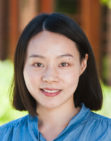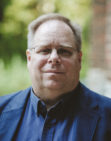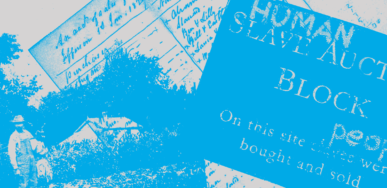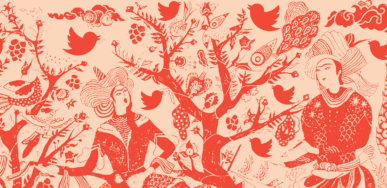
Season 3, Episode 7
Field Notes: War on Christmas, Peace on Christmas
[00:00:01] Kurtis Schaeffer I'm Kurtis Schaeffer
[00:00:02] Martien Halvorson-Taylor and I'm Martien Halvorson-Taylor. And this is Sacred & Profane.
[00:00:09] Kurtis Schaeffer This week on the show, we're featuring work from one of our lab partners in an ongoing series we call Field Notes
[00:00:16] Martien Halvorson-Taylor Here in the States. It's become an annual tradition for conservative commentators to bemoan the "war on Christmas." That's the idea that Christmas is being pushed out in favor of non-Christian holidays or more secular winter celebrations.
[00:00:33] Kurtis Schaeffer But as our fellow Jue Liang tells us, in China, the government is actually cracking down on Christmas - and many other holidays - as the ruling party looks to the calendar as a way to promote Han Chinese identity. We'll let Jue take it from here.
[00:00:54] Jue Liang On the morning of December 25th, 2019, I woke up to a grapefruit sized apple by my bedside. I was back at my parents’ house in Chengdu after a two week long field trip to eastern Tibet. My mom said, "Merry Christmas" in Chinese. That's how you guys celebrate in the States, right? Then the memories came back to me, of a time when Christmas was the cool kids' holiday in China. In high school and in college, we gave each other apples that Christmas Eve because the Chinese word for apple, "ping guo," rhymes with the good wishes for Christmas Eve (ping ping an an) an evening of peace and tranquility.
[00:01:40] Jue Liang When I was chatting with my friend Xiao (a pseudonym), later. She also remembers the same tradition:.
[00:01:47] Xiao On Christmas Eve, many people have the creative interpretation that they are supposed to gift each other apples, because apple had the connotations of safety and peace (ping ping an an). And I remember in school you were see all sorts of big red apples in all kinds of pretty packaging. This all reminds you of a strong, true sense of the holiday, and you should celebrate it.
[00:02:21] Jue Liang I grew up in Chengdu, an ever growing metropolis in southwestern China. Churches, mosques, Buddhists and Daoist monasteries, all common sites. These sacred sites are scattered between the six highways circling the city. On Christmas, some go to churches for evening mass and party with friends afterward. Some just go right to the party part. When I was a kid, Christmas was cool and like a lot of cool things, it was frowned upon by adults. Christmas was a celebration for young people and young people only. Along with Valentine's Day, it is one of the only two times of the year when teenagers and young adults can celebrate with their friends, also their homes. Christmas was really a small app token value to me and my friends growing up in Chengdu. It has very little to do with, quote unquote, religion. Now that I live in the States, I no longer celebrate Christmas with opposing parties in the way I used to. Not many people back home celebrate, either. For the past two years, there has been an official crackdown on Christmas celebrations in China. Another "war on Christmas," maybe. Headlines like China bans Christmas circulated around the web.
[00:03:45] NPR Santa Claus is no longer welcome in a Chinese city where local authorities this year banned all things for Christmas.
[00:03:52] The Guardian Chinese authorities are cracking down on Christmas. Several cities, schools and government institutions have ordered citizens not to celebrate the holiday and to instead focus on promoting traditional Chinese culture.
[00:04:08] The New York Times No Santa, no trees and no stockings and no lights.
[00:04:19] Jue Liang The kind of cool Christmas I remember as a kid was cool, partly because it didn't feel like a Chinese tradition. And that's exactly why Christmas has become a conflict in China today. According to China's constitution, religion should be independent and free from foreign interference. Christmas isn't the only celebration that has become controversial in the last few years. The tightening grip does not only affect Western holidays and traditions like Christmas or Valentine's Day break. No official and traditional holidays from across China are beckoning for space in the Chinese calendar. For example, the International Workers Day on May 1st has been extended into a week long holiday. So has the first day of October, the National Day of the People's Republic of China. But the new National Day celebration often overlaps with the Mid-Autumn Festival, a popular folk festival. Other folk or traditional holidays have disappeared from the official calendar altogether. Just because they're no longer official doesn't mean people have stopped celebrating them. I asked around for stories of holidays celebrated by the young and old in public and private among smaller groups or in the wider community. There are also stories of shifting dates, forgotten traditions and people trying to keep those traditions alive as the calendar changes.
[00:05:58] Jue Liang Do you mind sharing with us your religious beliefs?
[00:06:02] Xiao I don't have any other religious beliefs.
[00:06:06] Jue Liang Meet my friend Xiao again. She grew up in a more rural areas in southwestern China, and recieved her college education in the city. When I ask her about her impression of Christmas, it wasn't very religious at all.
[00:06:20] Xiao This is a time you can buy all sorts of discounted stuff. Everywhere is lit up by colorful lights. You also see Santa Claus, everywhere, in store windows, outside of the gated communities or even outside schools.
[00:06:43] Jue Liang I asked her, do you celebrate Christmas?
[00:06:48] Xiao I sometimes celebrate Christmas. We have friends say, let's go out to eat dinner shopping or to go see a movie. Then we go out. If no one asked me to go out to celebrate, I won't celebrate it to myself.
[00:07:04] Jue Liang For her, it is not a tradition that she grew up with.
[00:07:09] Xiao in Muli, where I grew up. It's a cultural Tibetan area. No one knows about Christmas. We read a little passage about Christmas in our textbooks and we know it's a Western holiday. But Christmas had nothing to do with us.
[00:07:28] Jue Liang Another friend of mine who works in office job sees Christmas as a time where adults make up excuses to have a little fun.
[00:07:39] Shu (pseudonym) After graduating and getting a job, Christmas became even more important to me. We needed more holidays to break up the daily parade of work. So last year we put up small Christmas trees and decorated the whole office. I even got Christmas special wines so everyone can relax together.
[00:08:02] Jue Liang She also told me that due to recent measures to crack down Christmas, this celebration only made one appearance.
[00:08:10] Jue Liang The Christmas trees might be taken down and the decorations nowhere to be found. But remember those apples they take on another different meaning in my conversation with a group of Tibetan college students. Christmas for them is certainly not the most important holiday, but they occasionally participate, especially near college, with their non-Tibetan friends. In their experience, the act of giving apples is interpreted as him offering a distinct Buddhist notion.
[00:08:46] Drolma (pseudonym) When they gave me apples, they told me, you need to make a wish, something like wishing your family to be healthy and safe on Christmas Eve. Whatever wish you have, you can tell Santa Claus, he will hear your wishes and make them come true.
[00:09:03] Jue Liang . Here, the Tibetan student trauma refers to Santa Claus as "shen dan lao ye" - "Old grandpa of Christmas" or "Old Lord Christmas," a term usually reserved for local deities in Chinese. Another student chimed in, saying that she has also heard that people pray to Christmas trees at night when it is the only thing lit up in the darkness.
[00:09:36] Jue Liang Of course, Old Lord Christmas is hardly the most important god in any of the many traditions in today's China. For these Tibetan students a quiet, semipublic commemoration called Galdan Namchot is a most important day of the year, and like Christmas, it is a holiday that is being pushed out of China's public calendar. Galdan Namchot is the day that commemorates the day of birth and enlightenment for the renowned Buddhist master Je Tsongkhapa. It falls on the 25th day of the 10th month of the Tibetan calendar, usually in November or December.
[00:10:15] Deyki (pseudonym) The most important holiday for me is the day of birth and enlightenment, so the renowned Buddhist teacher Je Tsongkhapa. I have been celebrating this since I was a kid and we all we all light butter lamps as a family and it is a happy event for all of us.
[00:10:30] Jue Liang Another student chimed in, saying that this is a day you cannot be angry or sad. You have to be happy.
[00:10:41] Deyki In high school, sometimes we get a day off for Galdan Namchot. I attend a high school in a Tibetan autonomous prefecture, so we're allowed to go to the monastery on that day because I'm from Serta.
[00:10:54] Jue Liang Serta a county in eastern Tibet where Larung Buddhist academy, or Larung Gar, is. Larung Gar is likely the biggest Buddhist monastery in the world.
[00:11:08] Deyki We will all go toL Larung Gar. There's a lot of prepatory work to do because we take this day very seriously. The festival goes from 8:00 in the evening to 4:00 in the morning. It is a day of quiet meditation and prayers. Because my high school sits right across the monastery, we are not allowed to go during class time, but we can go after school and then we're supposed to eat only vegetarian on that day.
[00:11:36] Jue Liang For another student from Dawu, she remembers fondly when she was young and elementary school teachers would just cancel class on that day and take all the kids to the monastery. In middle school, everyone will gather on the track field with other lamps at night and pray together. This lamps are supposed to stand as a Buddhist metaphoric wisdom that dispels darkness of ignorance.
[00:12:05] Drolma when I arrived here, for college, no one organized anthing for Namchot Duchen here. But no one else prohibits us from doing anything. You can do whatever you want. I have a friend who is very knowledgeable in Buddhist practices, so every year he will remind us of the festival and collect donations for prayers and butter lamps. We can either do it ourselves or ask him to light the butter lamps for us. There are no public recitations of scriptures, but we will read some of Master Tsongkhempa's writings.
[00:12:54] Jue Liang Another important holiday for both Han Chinese and Tibetans is the Lunar New Year.
[00:13:01] Xiao The most meaningful festival in the whole year is probably the Lunar New Year. You know, the others don't... Oh, and Sagadawa. The others are not important.
[00:13:18] Jue Liang For the younger students, I talked to the struggle of celebrating New Year or Losar in Tibetan, starts when they have to get up super early, like 4:00 in the morning.
[00:13:29] Drolma We end up with the idea that if you don't get up early on the first day of the year, you just can't be early in that whole year. Yes. This is what my mom taught me.
[00:13:41] Jue Liang Beyond that, much of what it means to celebrate the new year is considered lost by many, including Dorje and Lhamo. They are both Tibetans educated in Han Chinese schools from an early age on, and are now teaching in colleges in Chengdu. Lhamo grew up in eastern Tibet, area traditionally adjacent to the Han Chinese culture and has adopted the Chinese calendar when celebrating the New Year. Dorje grew up in Lhasa in central Tibet, where the Tibetan calendar remains operative in such celebrations. Despite their calendrical differences, both Dorje and Lhamo agree that the flavor of the new year is no longer readily accessible.
[00:14:31] Dorje (pseudonym) When I was at a kid, niawei for Tibetan New Year was much stronger and I looked forward to the celebration. Not so much these days. Plus, all of my older relatives passed away, so I feel even less of a need to go back to Lhasa.
[00:14:57] Jue Liang There is no official campaign against the Lunar New Year, but Dorje and Lhamo don't even do New Year anymore. It is too crowded because everyone gets off on the same days. Traffic is crazy. They usually meet with family members before or after, or sometimes even choose to travel abroad to avoid the crowd.
[00:15:20] Lhamo (pseudonym) During the New Year's celebrations, especially on the first day, you will get up very early and my mom will take us to pray to Avalokiteshvara...
[00:15:30] Dorje Yes, we do that too.
[00:15:32] Jue Liang So we have a custom of doing that. We must go to the monastary
[00:15:36] Dorje Well, yes, to be more specific, we must go to Jokhang.
[00:15:41] Jue Liang People usually put on their Sunday best were going to the Jokhang temple, but the new year is on quite another level. Dorje again .
[00:15:53] Dorje People take their appearances very seriously. Our family style is quite simple. So we just picked something neat and clean for the new year, but not for some other people, they absolutely show up in style. They really have... how to put it captured all of your attention when their whole family shows up. You can't take your eyes on what they wear on their neck, which they put on their heads, what they hold in their hands. You have to look at them. They're truly a spectacle.
[00:16:31] Dorje Nowadays, there is a saying in Lhasa by local people, you can only taste the flavor of the new year in the countryside, not within the city of Lhasa. Even though there are people in the city who want to preserve the tradition of a long New Year's celebration to create an atmosphere for it. It always felt forced. If anyone can be completely relaxed a week or even 10 days off to celebrate the new year, it has to be those living in the countryside.
[00:17:01] Jue Liang Again, the calendar - this time, our five-days-a-week work calendar - remains a factor in deciding when, where and how we celebrate in public or private, in groups big or small, or even just by ourselves. As I wrap up this audio documentary, it is approaching the end of the year and the holiday season returns again for many after a global disturbance of celebrations everywhere. This might be a time for the flavor of the new year to come back again. My friends Xiao, Dorje, and Lhamo, and the Tibetan students, all commented on how the pandemic had put pause on their year end celebrations in 2020. However, as a mass Thanksgiving travel returns in the States, I have reason to believe that back at home, the traditions will see a revival as well. The youth might skip school to celebrate Christmas with friends. The line to make smoke offerings might come back. Butter lamps and prayers will light up the sky in the evening of Galden Namchot. And most importantly, the spectacular New Year ensemble will once again catch everyone's eyes in Jokhang. No matter what is written on the official calendar, holidays are still part of the rhythm of their years - and mine.
[00:18:48] Kurtis Schaeffer Sacred & Profane was produced for the Religion, Race & Democracy Lab at the University of Virginia. Our senior producer is Emily Gadek. Our program manager is Ashley Duffalo. Today's episode was reported by Jue Liang.
[00:19:03] Martien Halvorson-Taylor Music for this episode comes from Blue Dot Sessions. You can find out more about our work at religionlab.virginia.edu, or by following us on Twitter at the Religion Lab.
Many in the United States lament that Christmas celebrations have lost their significance as a religious holiday. But in China, instead of gathering with family members, Christmas celebrations are used mainly by the younger generation as excuses to get out of the house and spend time with their peers. However, with measures to crack down on Christmas celebrations in China in recent years, this small act of rebellion might be lost.
So are many other festivals in China—foreign or local, traditional or new. These dates have to battle other official holidays for space in the Chinese calendar. Some are highlighted and given days off nationwide, while others are kept within local circles. In this episode, I collected stories of holidays celebrated by the young and old, in public and secret, among smaller groups, or in a wider community. There are also stories of shifting dates, forgotten traditions, and people trying to keep those traditions alive as the calendar changes.
Note: all names of interviewees have been changed.
How to cite this piece:
Halvorson-Taylor, M., Schaeffer K. (Presenters), Liang, J. (Reporter) & Gadek, E. (Producer), “War on Christmas, Peace on Christmas” Sacred & Profane (2021, December 21).
Related Content:
Tibet’s First Female Philosophers by Andrew S. Taylor
This piece drops you into the middle of a remote Tibetan valley, into Larung Gar, the world’s largest monastery. But there are no yoga mats, singing bowls, or healing crystals here, only some brilliant intellectuals striving to make the world a more compassionate place.
Additional Reading
Sun, Shuyun, and British Broadcasting Corporation (production company). Year In Tibet: Episode 3, Faith, Hope and Charity. London: British Broadcasting Corporation (BBC), 2013.
May, Tiffany. “Chinese City Bans Christmas Displays Amid Religious CrackdownChinese City Bans Christmas Displays Amid Religious Crackdown.” The New York Times. December 19, 2018. https://www.nytimes.com/2018/12/19/world/asia/china-christmas-display-ban.html
Xu, Yuhan. “Sorry, Santa: A Chinese City Has Just Banned All Things Christmas.” NPR. December 21, 2018. https://www.npr.org/sections/goatsandsoda/2018/12/21/679120561/sorry-santa-a-chinese-city-has-just-banned-all-things-christmas
Additional Credits
My deepest thanks to Xiao, Shu, Drolma, Dekyi, Dorje, and Lhamo for sharing their memories with me, and to voice actors Lucy Desmond, Alanna Duprez, Zhuoer Hui, Sarah Kovacic, Andrew S. Taylor, and Chenxuan Yin.
Sponsored by the Luce/ACLS Program in Religion, Journalism & International Affairs








